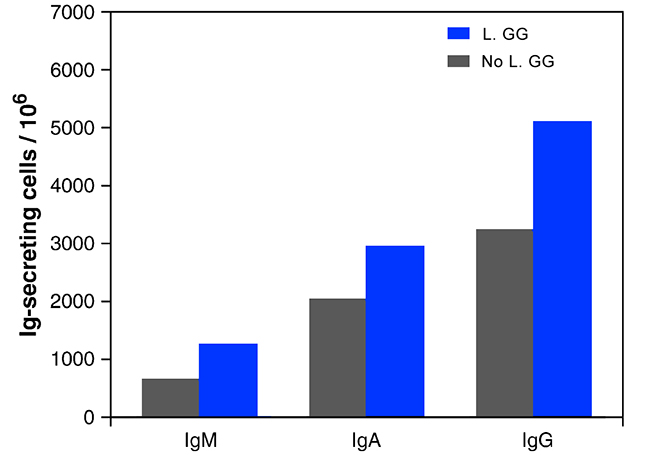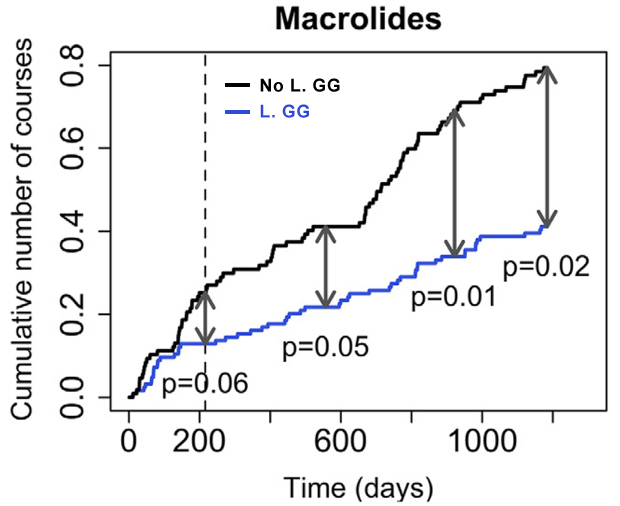Healthy intestinal microbes = healthy immunity
LACTOGGРђЎs probiotic helps to establish a strong and vigorous intestinal microbial ecosystem which in turn gives rise to healthy and balanced immunity.
The presence of the GG probiotic in the intestinal tract promotes the growth of a diverse and vigorous microbial community. Furthermore, the correct quantity of the dietary fibre, fructooligosaccharide (FOS) which is found in LACTOGG®+ sachets gives it prebiotic benefits as it promotes the growth of other good bacteria such as bifidobacteria.
Premature infants given GG probiotic and probiotics for their first 2 months of life had less frequent respiratory tract infection, especially those caused by viruses, during their first year of life. Those non-GG babies did not experience this beneficial effect. This study shows that using the GG probiotic and prebiotics to establish the microbes which colonise babies very early in life can benefit their developing immune system.
Clinical studies have shown how LACTOGG┬«РђЎs probioticРђЎs boost in immunity results in significant benefits.
Examples of these research findings are:
Рђб Mothers who consumed GG probiotic during pregnancy were found to have GG bacterial DNA in the amniotic fluid and placenta. When the babies who were born to these РђюGGРђЮ mothers were tested shortly after birth, their immunity showed higher maturity than the other non-GG babies.
Рђб Infants who took GG probiotic were found to have increased number and maturation of their immune cells which manufacture antibodies.

Comparison of the number of antibody-secreting cells in babies at 1 year old. GG probiotic increases cells which secrete antibodies M, A and G[Rinne et al. 2005]
Рђб Babies who were exposed to GG probiotic during pregnancy and in the first 6 months of life had 50% less chance of developing allergic eczema. The РђюGGРђЮ babies had higher levels of immune regulatory factors which reduced allergic inflammation.
Рђб Allergy sufferers such as those with allergic eczema, cow milk allergy and allergic nose, experienced significant improvement in their allergic conditions when they were given the GG probiotic. Their immune system also showed less allergic hallmarks.
Рђб Infants with proven cow milk allergy recover from their allergy faster if they were given GG probiotic daily in the first year of life.
Рђб Children given GG probiotic had less chance of contracting intestinal infections (gastroenteritis) and recovered faster from gut infections.
Рђб Infants, toddlers and older children were noted to fight infections better and needed less antibiotics. This improvement in immunity continued to be apparent over long periods of time.

Total number of courses of antibiotic (macrolides) used by children over 3 years. Dotted line marks the end of 7 months of dally consumption of GG probiotic. The GG group used 48% less antibiotic over the 3 years compared to those not given the probiotic. [Korpela et al. 2016]
Рђб Adults also showed improved ability to fight infections, such as lung infections and travellerРђЎs diarrhoea.
Рђб It has been used in hospitals to clear superbugs from the intestinal tract in children and adults.
Рђб Children and adults suffering from intestinal inflammation conditions were found to have reduced inflammation after consuming the GG probiotic.
Amount of faecal calprotectin (an indicator of intestinal inflammation) is lowered after Lactobacillus GG is consumed. [Bruzzese E et al. 2014]
Рђб The immune response to vaccinations was noted to be enhanced significantly when people were taking the GG probiotic during the time of vaccination.
Рђб Drinking alcohol sets-up much inflammation in the gastrointestinal tract and liver which progresses to liver damage. Taking the GG probiotic prevents and reverses liver inflammation and damage as it increases Treg cells and reduces the number of immune cells responsible for intestinal and liver inflammation.
LACTOGG┬«РђЎs ability to РђўtalkРђЎ to our immune system means that it can РђўeducateРђЎ, mature, stimulate and РђўbalanceРђЎ our immune system.
We can make use of LACTOGG® capsules or LACTOGG®+ sachets to maintain long term, healthy stimulation of our immunity.
How should LACTOGG® be taken?
Babies, children and adults:
At least 1 capsule or 1 sachet a day
References:
Cox MJ et al. Lactobacillus casei abundance is associated with profound shifts in the infant gut microbiome. PLoS ONE 2010;5(1):e8745
Luoto R et al. Prebiotic and probiotic supplementation prevents rhinovirus infections in preterm infants: A randomized, placebo-controlled trial. J Allergy Clin Immunol 2014;133:405-13
Rautava S et al. Probiotics modulate host-microbe interaction in the placenta and fetal gut: A randomized, double-blind, placebo-controlled trial. Neonatology 2012;102:178-184
Kalliomaki M et al. Probiotic in primary prevention of atopic disease: a randomised placebo-controlled trial. Lancet 2001;357:1076-1079
Marschan E et al. Probiotics in infancy induce protective immune profiles that are characteristic for chronic low-grade inflammation. Clin Exp Allergy 2008;38:611-618
Viljanen M et al. Probiotics in the treatment of atopic eczema/dermatitis syndrome in infants: a double-blind placebo-controlled trial. Allergy 2005;60:494-500
Isolauri E et al. Probiotics in management of atopic eczema. Chin Exp Allergy 2000;30:1604-1610
Piirainen L et al. Effect of Lactobacillus rhamnosus GG on rBet v1 and rMal d1 specific IgA in the saliva of patients with birch pollen allergy. Ann Allergy Asthma Immunol 2008;100(4):338-342
Kawase M et al. Effect of fermented milk prepared with two probiotic strains on Japanese cedar pollinosis in a double-blind placebo-controlled clinical study. Int J Food Microbiol 2009;128(3):429-434
Majamaa H et al. Probiotic: A novel approach in the management of food allergy. J Allergy Clin Immunol 1997;99:179-185
Pohjavuori E et al. Lactobacillus GG effect in increasing IFN-╔Б production in infants with cow's milk allergy. J Allergy Clin Immunol 2004:114:131-136
Berni Canani R et al. Effect of Lactobacillus GG on tolerance acquisition in infants with cowРђЎs milk allergy: A randomized trial. J Allergy Clin Immunol 2012;129(2):580-581
Berni Canani R et al. Probiotics for treatment of acute diarrhoea in children: randomised clinical trial of five different preparations. BMJ 2007;335(7615):340
Kaila M et al. Enhancement of the circulating antibody secreting cell response in human diarrhea by a human L. strain. Pediatr Res1992;32(2):141-144
Guandalini S et al. Lactobacillus GG admin in oral rehydration solution to children with acute diarrhoea: A Multicenter European Trial. J Pediatr Gastrpenterol Nutr 2000;30(1):54-60
Oberhelman R et al. A placebo-controlled trial of Lactobacillus GG to prevent diarrhea in undernourished Peruvian children. J Pediatr 1999;134:15-20
Szajewska H et al. Efficacy of Lactobacillus GG in prevention of nosocomial diarrhea in infants. J Pediatr 2001;138:361-365
Korpela K et al. Lactobacillus rhamnosus GG intake modifies preschool children's intestinal microbiota, alleviates penicillin-associated changes, and reduces antibiotic use. PLoS ONE 2016
Hojsak I et al. Lactobacillus GG in the prevention of nosocomial gastrointestinal and respiratory tract infections. Pediatrics 2010;125(5):e1171-7
Hatakka K et al. Effect of long term consumption of probiotic milk on infections in children attending day care centres: double blind, randomised trial. BMJ 2001:322(7298):1327
Hojsak I et al. Lactobacillus GG in the prevention of gastrointestinal and respiratory tract infections in children who attend day car centers: A randomized, double-blind, placebo-controlled trial. Clin Nutr 2009
Kukkonen K et al. Long-term safety and impact on infection rates of postnatal probiotic and prebiotic (synbiotic) treatment: randomized, double-blind, placebo-controlled trial. Paediatrics 2008;122:8-12
Morrow LE et al. Probiotic prophylaxis of ventilator-associated pneumonia. A blinded, randomized, controlled trial. Am J Resp Crit Care Med 2010;182:1058-1064
Oksanen PJ et al. Prevention of travellers' diarrhoea by Lactobacillus GG. Ann Med 1990;22:53-56
Szachta P et al. An evaluation of the ability of the probiotic strain Lactobacillus rhamnosus GG to eliminate the gastrointestinal carrier state of vancomycin-resistant entercocci in colonized children. J Clin Gastroenterol 2011:45(10):872-877
Manley KJ et al. Probiotic treatment of vancomycin-resistant enterococci: a randomised controlled trial. Med J Aust 2007;186(9):454-457
Cheng VCC et al. Decolonization of gastrointestinal carriage of vancomycin-resistant Enterococcus faecium: case series and review of literature. BMC Infect Dis 2014;14-514
Bruzzese Eet al. Disrupted intestinal microbiota and intestinal inflammation in children with cystic fibrosis and its restoration with Lactobacillus GG: A randomised clinical trial. PLoS ONE 2014;9(2):e87796
Malin M et al. Promotion of IgA immune response in patients with Crohn's disease by oral bacteriotherapy with Lactobacillus GG. Ann Nutr Metab 1996;40:137-145
Gosselink MP et al. Delay of the first onset of pouchitis by oral intake of the probiotic strain Lactobacillus rhamnosus GG. Dis Colon Rectum 2004;47(6):876-884
Zocco MA et al. Efficacy of Lactobacillus GG in maintaining remission of ulcerative colitis.Aliment Pharmacol Ther 2006;23:1567-1574
Davidson LE et al. Lactobacillus GG as an immune adjuvant for live-attenuated influenza vaccine in healthy adults: a randomised double-blind placebo controlled trial. Eur J Clin Nutr 2011;65:501-507
de Vrese M et al. Probiotic bacteria stimulate virus-specific neutralizing antibodies following a booster polio vaccination. Eur J Nutr 2005;44(7):406-413
Chen R-C et al. Lactobacillus rhamnosus GG supernatant promotes intestinal barrier function, balances Treg and TH17 cells and ameliorates hepatic injury in a mouse model of chronic-binge alcohol feeding. Toxicol Lett 2016;241:103-110
Bajaj JS et al. Randomized clinical trial: lactobacillus GG modulates gut microbiome, metabolome and endotoxemia in patients with cirrhosis. Aliment Pharmacol Ther 2014;39(10):1113-1125
Hammes TO et al. Lactobacillus rhamnosus GG reduces hepatic fibrosis in a model of chronic liver disease in rats. Nutr Hosp 2017;34(3):702-709